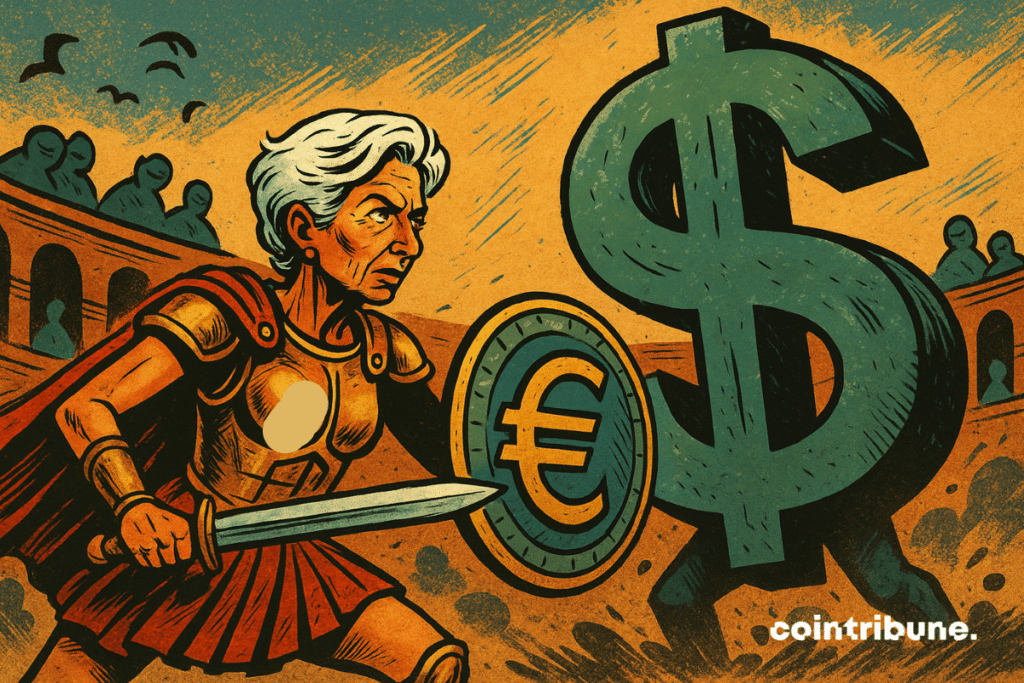Christine Lagarde Proposes Strategic Rise Of The Euro
What if the euro finally established itself as the global reference? In Berlin, Christine Lagarde surprised her audience by stating that the European single currency could replace the dollar as the main pillar of international reserves. Behind this bold statement, the ECB president outlines a clear strategy : to equip the European Union with the necessary levers to weigh financially and geopolitically. Thus, in a world undergoing reconfiguration, this ambition redefines monetary power relations and places the euro at the heart of a new global balance in the making.

In brief
- Christine Lagarde believes that the euro can replace the dollar as the main global reserve currency.
- This statement comes amid geopolitical tensions and a loss of confidence in the US dollar.
- Lagarde introduces a new geopolitical dimension: the monetary credibility of the euro also depends on the EU’s military power.
- The Berlin speech marks a clear will to evolve the euro’s global role, provided there is a collective political commitment.
The euro facing a weakened dollar : a strategic turning point?
Faced with a global dynamic of gradual disengagement from the dollar and the rise of settlements in local currencies, notably illustrated by the acceleration of this transition within the BRICS, Christine Lagarde has taken a position.
During a speech delivered in Berlin on “the role of Europe in a fragmented world”, the president of the European Central Bank surprised by affirming that the current geopolitical shifts could lead to an unprecedented role for the single currency.
“The ongoing changes pave the way for a global moment for the euro”, she declared. She stressed that this dynamic will not be automatic. The euro will not gain influence by default; it must earn it.
Due to the increasing volatility of the dollar, caused by what she describes as “erratic economic policy” in the United States, investors have begun reducing their exposure to the American currency. However, few have chosen the euro as an alternative. “Many have opted for gold instead, seeing no direct alternative”, she acknowledged.
For Lagarde, this investor hesitation is explained by clearly identified shortcomings in the European financial architecture. The lack of depth in the eurozone capital markets prevents the emergence of a solid base for the euro’s internationalization. The ECB president highlighted several major structural obstacles:
- A persistent fragmentation of financial markets, limiting the attractiveness of European assets internationally ;
- The absence of a pan-European safe asset, equivalent to US Treasuries, to which institutional investors could turn in times of turbulence ;
- Financial institutions considered incomplete due to political reluctance towards greater budgetary and banking integration ;
- A lack of interest from European governments in a truly federal monetary project, hindering any collective momentum.
These structural weaknesses, inconsistent with the EU’s economic weight, currently hinder the euro’s ambitions on the global stage. Lagarde therefore offers a clear diagnosis for Europe: without profound reforms, the single currency will lag behind the dollar, even in a world seeking alternatives.
The euro, a currency of power : when geopolitics enters the monetary debate
Christine Lagarde goes beyond a financial observation. She insists on a condition rarely mentioned in the economic debate: military power as a pillar of monetary credibility.
“Investors, particularly institutional ones, also seek geopolitical guarantees in another form. They invest in assets from regions that are reliable security partners and can honor their alliances through military power”, she emphasized.
This statement marks a major shift. For the euro to rival the dollar, the European Union must also assert itself as a credible strategic and security force. In other words, a currency’s attractiveness depends as much on the stability of its issuer as on its capacity to influence the global order.
In this perspective, Lagarde suggests several concrete avenues for Europe : to conclude new trade agreements with other blocs like the BRICS, improve cross-border payments, and strengthen liquidity agreements between the ECB and other central banks to expand the international use of the euro.
She suggests that joint financing of public goods could allow the EU to gradually increase its supply of safe assets. A proposal that still meets resistance from some members, such as Germany, reluctant to any budgetary mutualization mechanism. However, for Lagarde, this evolution is necessary if Europe wants to move from the status of economic bloc to that of a global player capable of influencing global financial flows, notably through initiatives like the planned launch of the digital euro from October 2025, confirmed by the ECB.
Maximize your Cointribune experience with our "Read to Earn" program! For every article you read, earn points and access exclusive rewards. Sign up now and start earning benefits.
Diplômé de Sciences Po Toulouse et titulaire d'une certification consultant blockchain délivrée par Alyra, j'ai rejoint l'aventure Cointribune en 2019. Convaincu du potentiel de la blockchain pour transformer de nombreux secteurs de l'économie, j'ai pris l'engagement de sensibiliser et d'informer le grand public sur cet écosystème en constante évolution. Mon objectif est de permettre à chacun de mieux comprendre la blockchain et de saisir les opportunités qu'elle offre. Je m'efforce chaque jour de fournir une analyse objective de l'actualité, de décrypter les tendances du marché, de relayer les dernières innovations technologiques et de mettre en perspective les enjeux économiques et sociétaux de cette révolution en marche.
The views, thoughts, and opinions expressed in this article belong solely to the author, and should not be taken as investment advice. Do your own research before taking any investment decisions.